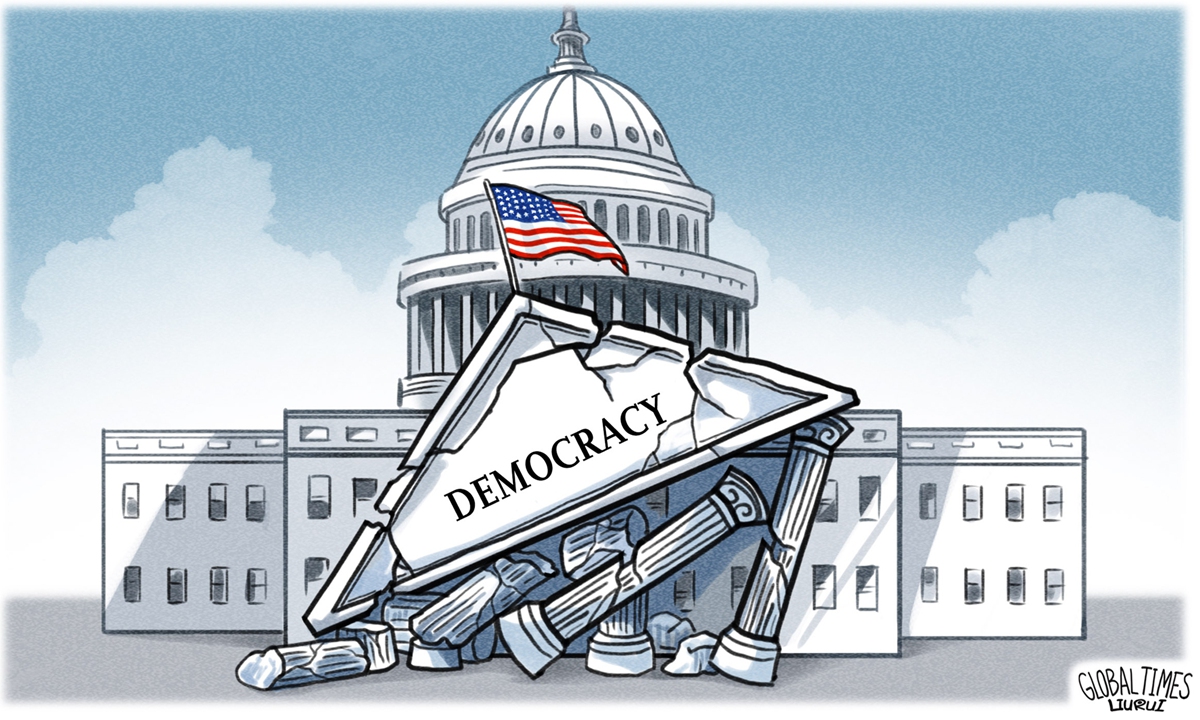
Crumbling US democracy. Illustration: Liu Rui/GT
In US foreign strategy, the export of democracy has always been important. But this didn't work well in the past years. Why? Perhaps it is because the so-called like-minded countries of the US, and even Americans themselves, no longer believe US democracy sets a good example.
According to a Pew Research Center poll on Monday, "very few think American democracy is a good example for other countries to follow."
It shows that outside the US, a median of 80 percent of respondents say US democracy "used to be a good example, but has not been in recent years," or the US has never been a good example for democracy. Americans are just about as negative - with only 19 percent saying US democracy provides a good example.
If people around the world are asked to list recent achievements of the US, they may need some time before naming one or two. However, if the question is about problems with US democracy, cases are ready to roll off the tongue. For example, the US' inept COVID-19 fight that has killed more than 748,000, the racial discrimination that hasn't improved but worsened since George Floyd's murder, the empty shelves in grocery stores, and supply chain problems.
Some of these are "milestones" for the US - but not the milestones ordinary Americans hope to see. The US is no longer the "beacon of democracy," but becoming more like a laughingstock of democracy.
"The Pew survey results show ordinary people have a clearer head than elites. The results are meaningful," Li Haidong, a professor at the Institute of International Relations of the China Foreign Affairs University, told the Global Times.
"If the US, where white supremacy prevails and somehow dominates; where elites and ordinary people are divided, while elites also seriously contradict each other; where governance has failed, sets a good example for democracy, then what kind of democracy is a bad example?" Li noted. "US democracy is an insult to 'democracy.'"
However, Washington is still attacking and smearing other countries under the guise of democracy and pointing a finger at other countries' so-called democratic problems. The US is in no position to preach democracy to others, but its elites are not as aware.
Those elites seem to be living in a parallel universe and cannot see the sufferings of ordinary Americans. In their eyes, good stock market numbers mean a good economy, which in turn means a sound livelihood for people. To them, despite the port logjam and empty shelves in stores, high prices is "a good thing" because it reflects a healthy, growing economy.
"Living high on the hog, US elites don't understand the ordinary people's hardships. They lack empathy and respect. The result is their blind belief that the US is always a model for the world. But this is clearly not the case for most people of the world," Li said.
Another poll on Monday, the NPR/PBS NewsHour/Marist poll, found that 81 percent of Americans believe there is a serious threat to the future of US democracy - and are evenly split on whether Democrats or Republicans pose a bigger threat.
From this perspective, US bipartisan elites' practice of democracy is satire. They have failed to see the world from the other's perspective, and have not responded to the American people's real needs. To them, democracy is the best tool to reap political gains. So it is not hyperbole to say those elites are the biggest threat to US democracy.
In May this year, a global poll commissioned by the Alliance of Democracies Foundation among 50,000 respondents in 53 countries showed that the US is seen as a bigger threat to democracy than Russia or China. With so many tricks, the US has failed to fool the world. Maybe it is time for US elites to focus on solving problems at home instead of preaching "democracy" globally by so-called American standards.




